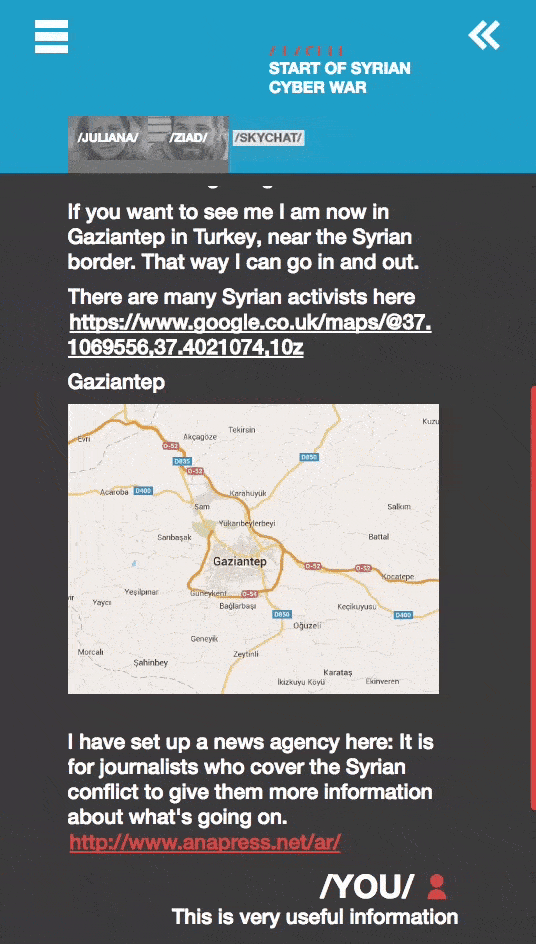Al Jazeera launches interactive investigation #Hacked
#Hacked – Syria’s Electronic Armies puts the user in the role of a journalist who must navigate hackers and viruses.

“This is actual investigative journalism with real people, not just an interactive game. It’s a real story that shows how being careless on the Internet can have huge consequences,” explains senior producer Juliana Ruhfus about #Hacked – Syria’s Electronic Armies, Al Jazeera’s new interactive immersive news experience that puts the user in the seat of an investigative journalist.
In #Hacked, the user must navigate a virtual minefield of viruses, hackers and potentially unreliable sources. And it’s all based on real-life experiences.
Keep reading
list of 4 itemsWall Street Journal cuts Hong Kong staff, shifts focus to Singapore
Abu Dhabi-backed group ends bid to take over Telegraph newspaper
Two Russian journalists arrested over alleged work for Navalny group
“You are an investigative journalist who has to find as much reliable information as possible in the shortest amount of time,” says Ruhfus. “This means you have to talk to ‘good’ white hat hackers, but also to ‘bad’ black hat hackers.”
The groundbreaking new web app takes the user deep into Syria’s cyberwar. Ever since the start of the conflict in 2011, Syria’s war has been waged on a virtual battlefield as well as a physical one.
Al Jazeera and several other media organisations became part of this virtual war when they were attacked by the Syrian Electronic Army (SEA), a group of hackers connected to the government of Syrian President Bashar al-Assad.
The SEA plays a large role in #Hacked. “You have to make sure your communication is secure and that you take precautions so you do not get hacked yourself,” explains Ruhfus. Of course, such hacks are limited to the virtual environment but they are based on real-life hacks.
“The important thing here is that we actually make your click matter. Depending on what decision you make, you get a different outcome,” says Ruhfus. “So you have to decide between safety and journalism on several occasions. For example, do you allow a Syrian hacktivist to be interviewed with a mask to protect his and his family’s safety, or do you make him take the mask off so you can show his face to appear more credible? These are the sort of decisions we present you [with], and you always have to decide between your story, your safety, and the safety of your sources.”
Ruhfus emphasises that although #Hacked is, in essence, journalism in news format – the whole story in it is taken from reality and include links to real social media profiles of the hacktivists and other people featured in the web app.
“We want people to know this is not a fictional game. This is all real life, this is how the Syrian cyberwar has unfolded over the past couple of years. People have been arrested for doing things that we portray in this story. People have been hacked in real life. People have been tortured to reveal their social media content so that the regime could crack down on networks.”
#Hacked: Syria’s Electronic Armies – Start your investigation
To ensure that all the details were correct, Ruhfus sought advice from those who have been at the heart of Syria’s cyberwar. “Probably one of the most important people that we talked to is ethical hacker Ali Haidar,” she says. “He was a consultant during this project and has been keeping Syrian activists safe throughout the war. He made sure social media profiles were safe even when people were arrested by regime forces and he reverse-engineered hacks so they could be traced back to the original source.”
By using these examples from the field, Ruhfus hopes #Hacked will help users to learn not just about the digital war in Syria but also about their own security on the Internet. “I do believe that the news and documentaries serve a purpose to educate people, and that we as citizens in democracies have an obligation to learn new stuff. By turning these real-life scenarios into an interactive experience we try to be more engaging than a regular written story or documentary.”
But it was also important to Ruhfus that Syrians be involved in the project as she was conscious that turning their daily struggles into a game-like experience could be seen as disrespectful. ” As a white, Western journalist you know you’re in a different position from the people that go through these things every day of their lives,” she elaborates. “So it was obvious to me that I should listen to all the advice the people I worked with gave me.”

It’s not the first time that Ruhfus has worked on journalism in game format. In 2014, she released Pirate Fishing , in which the user is a journalist investigating Sierra Leone’s illegal fishing trade. For Ruhfus, this new “gamified” approach to storytelling is a way of reaching new audiences, including those who might not normally be interested in this kind of hard-hitting journalism.
“I think investigative journalism really lends itself to gamification because doing an investigation is like trying to solve a puzzle. We investigative journalists want to know how certain things work and how they are connected, and making that experience into a gamified investigation works very well,” she reflects.
Of course, condensing months’ worth of research into a web app that can be completed within a day poses challenges. “We have to simplify certain aspects of the whole process,” Ruhfus explains, “but there are a lot of decisions in this application that we as journalists have to make ourselves every day.”
Al Jazeera’s #Hacked – Syria’s Electronic Armies can be found at syhacked.com .